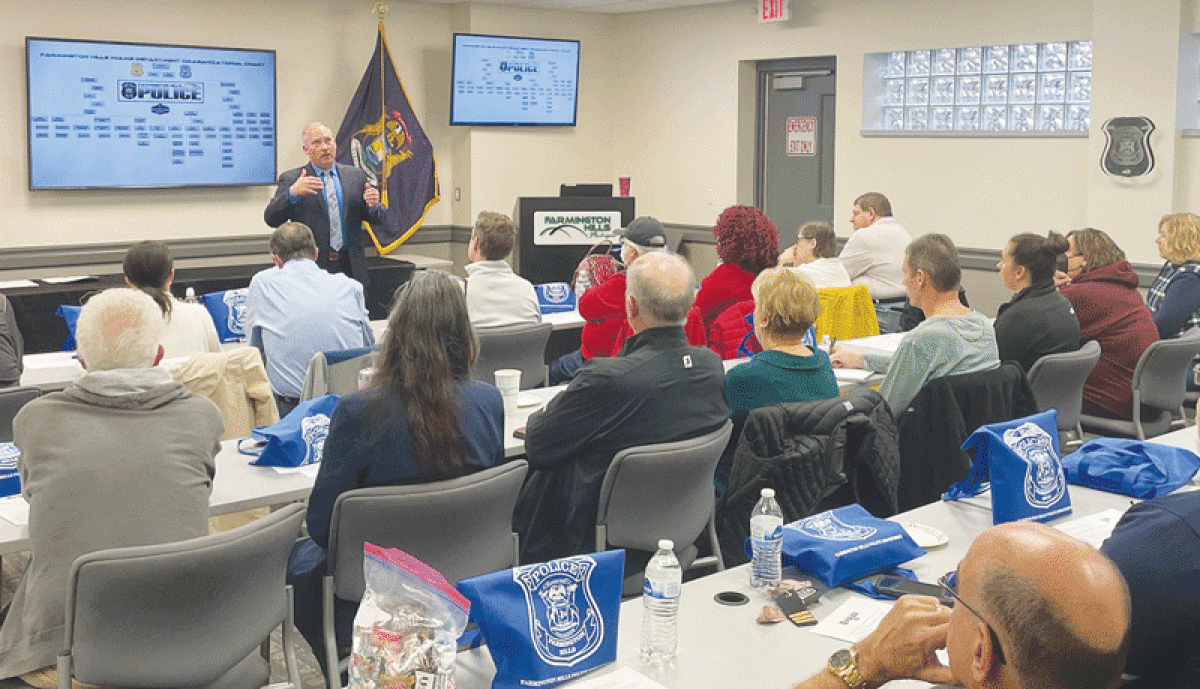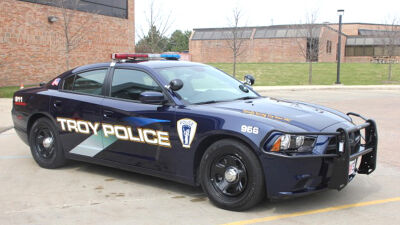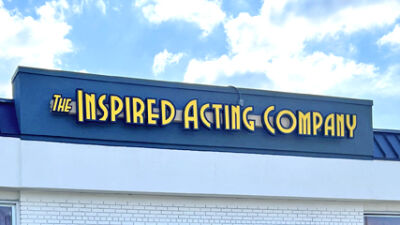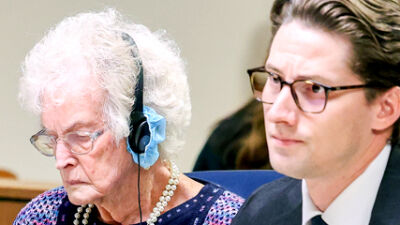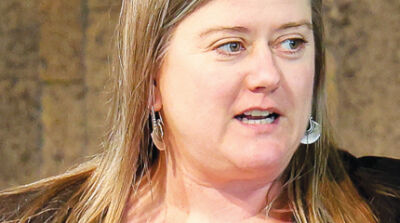FARMINGTON HILLS — Farmington Hills residents who are interested in learning about what the day of a police officer is like can do just that in the Citizens Police Academy next month.
A 10-week program is set to run 6-9 p.m. Thursdays, March 2-May 4. Participants must be at least 21 years old, reside within city limits and pass a fingerprints/background check.
The academy includes classroom instruction and demonstrations at the Farmington Hills Police Department as well as ride-alongs with officers.
There is no fee to participate.
Topics covered include patrol operations, the police K-9 unit, crime scene and evidence collection, criminal investigations, and an interactive firearms training simulator.
“The Citizens Police Academy is a 10-week, three-hour per (session) academy, structured around every aspect of the Farmington Hills Police Department — our administration, the operations … the operational aspects of every section, division, bureau within our department to try to expand the awareness and education of our citizens on what exactly our police officers do and, more importantly, why they do it,” said Farmington Hills Police Chief Jeff King. “I believe it makes them more knowledgeable and more either invested or committed to supporting the Police Department.”
Although there have been previous versions of a Citizens Police Academy, King said that they were “nothing as robust and comprehensive as what we have now.”
The current version was implemented last year, and King said that the plan is to have at least two courses per year, with one in the spring and the other in the fall.
The class is limited to 20 individuals.
“I don’t anticipate us running short of 20 people in the foreseeable future — that’s how popular the course is becoming,” King said.
Those who are interested in applying can call (248) 871-2760 or send an email to crimeprevention@fhgov.com.
If a spot is not available, King said, “You’ll be contacted and put on a waiting list.”
Farmington Hills City Council member Ken Massey participated in the Citizens Police Academy last year.
Aside from helping him have a better understanding of why the Police Department may request new equipment on occasion, Massey discussed another reason he wanted to participate.
“I wanted to know better what our police officers do,” he said. “With all the stuff going on out there about policing, I wanted to understand the training of the officers that are in the day-to-day routine — what kind of mental health training they have. … Our department has every person in that police building, from the dispatchers to road officers, all the way to command structure — all of them go through mental health first-aid. There’s no requirement in policing to have that training, and yet everyone who comes into contact with our public goes through that training.”
King said that the academy offers a combination of classroom instruction, field-scenario training and “forced response to resistance.”
Massey recalled the academy including real-life scenarios such as de-escalation and life-threatening situations.
“We have something called the MILO system,” he said, referring to the Multiple Interactive Learning Objectives system. “The MILO system has over 800 scenarios — it’s like an interactive video game with real-sized people, and you are wearing all of the equipment; you have a taser. You have pepper-spray. You have a baton. You have a gun. They’re not functional. They’re for training purposes, but they mimic what the officers carry, and you walk into a situation and you’re confronted with a person or persons.”
Part of MILO training involves discerning which situations are legitimate threats and which aren’t.
“In two-tenths of a second, you have to sort out who is who, why are they there and what’s really going on,” said Michael Sweeney, who is a Farmington Hills resident and a commissioner for the Farmington Hills/Farmington Emergency Preparedness Commission. “As a police officer, you have to be ready for all these different scenarios.”
King shared details on a particular kind of training officers don’t participate in.
“We don’t target practice in the Farmington Hills Police Department,” he said. “We do constant situational awareness training in response to any kind of resistance or violence. … That education, more importantly, that depth of explanation and awareness, I think that’s critical to our citizens. … That’s who we work for. That’s who we serve — our citizens.”
Farmington Hills resident Roger Avie is the chairman of the Farmington Hills/Farmington Emergency Preparedness Commission, and he also took part in the Citizens Police Academy last year.
He reflected on being part of a ride-along with a police officer.
“The police academy made (it) chillingly aware of the concerns that police officers have every day when they go on the street,” Avie said. “The drive-along, obviously, amplifies that. We were allowed to go out for eight hours with an officer and literally experience what they experience.”
Avie’s ride-along included searching for an individual who allegedly abused his girlfriend, helping direct traffic after there was an accident and two pull-overs.
Avie described going through the academy as a positive experience, with no negatives.
“It was a very comprehensive course on every aspect of police operations that I could even imagine,” he said. “It gave me and all of the other 20-plus people in our class a real insight to what the officers deal with on a daily basis, and I would recommend it for anybody who suggests that officers do not have proper training. I would say the Farmington Hills Police Department is the gold standard for the rest of the state.”
Massey shared a similar sentiment, and he also recalled being part of a ride-along.
“They don’t hold you back. You’re right in the middle, right in the mix,” he said. “So that level of appreciation, if people could have it, we’d have so much less complaining about our police officers. And I will add that, if other departments trained to the level that our agency does, we would have zero problems in other parts of the country.”
Massey shared what it was like going through scenario training.
“Each one of these scenarios are real-life scenarios, and the officer has to respond,” he said. “Your blood pressure is way up there. You’re talking to somebody who’s holding a gun and you have to decide, is this person a threat? Do you use deadly force? Can you talk them down? … That piece of it was really, really, incredible.”
From Sweeney’s point of view, individuals involved in the academy he participated in came away from it with a different perspective of police officers.
“Some of the folks who came into the class were skeptical, not entirely friends of the Police Department, and 10 weeks later … they’re saying, ‘Wow. This was eye-opening to see the type of training the officers get to be prepared for the type of environment they’re immersed in every evening,’” Sweeney said. “From this process, I learned that our police officers, the men and women, are some of the best-trained, nicest people, with the nastiest job that you ever wanna see. My respect for them went up tremendously, to see what they deal with every day.”
Aside from learning about some of the serious aspects of being in law enforcement, Sweeney said that the academy also offered some “fun stuff,” including meeting a K-9 patrol dog and a SWAT officer.
The training that officers go through is something that has stood out to him.
“The people teaching the classes were the Farmington Hills Police Department training officers,” Sweeney said. “Farmington Hills officers — they train, train, train, train. … Farmington Hills is an accredited and re-accredited police department, and going through this civilian police academy, we saw all the reasons how they got their accreditation, how they keep their accreditation and, frankly, how much safer we feel because of this Police Department here to protect us.”
King shared an important aspect of the Citizens Police Academy.
“Every citizen encounter is an opportunity to garner that relationship with our community, with our citizens — not only for the citizens, but for the officers,” he said. “Community and citizen engagement is critical in a police department for both parties. … It’s not ‘us and them.’ It’s a ‘we’ thing.”
Massey is a proponent of residents taking part in the academy.
“I think the academies will vastly improve the citizen-police interactions for those people who go through it,” he said. “There are gonna be people who don’t go through it because they have some preconceptions, and I think those are the people that really need to go through it, and if they did, they would suddenly go, ‘Oh, OK.’ … Even on (an) abbreviated version, you have a greater understanding of what kind of stress men and women of our Police Department have to face. … There’s some tough situations out there.”
 Publication select ▼
Publication select ▼